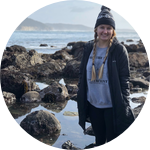About This Project
We all know sea otters prey on sea urchins, which graze on kelp. But what impact does this marine food web have on slowing climate change by reducing atmospheric CO2 levels?
We hope to be able to provide key information on this developing topic by researching how the presence or absence of a sea otter population affects carbon sequestration in kelp beds. We hypothesize Sea Otters have a direct impact on total CO2 uptake by kelp beds in which they share an ecosystem with.
Ask the Scientists
Join The DiscussionWhat is the context of this research?
Kelp is considered a keystone host, meaning it is an essential member of its ecosystem, because it provides a shelter and nutrient-dense food source to an abundance of organisms. Sea Otters are considered a keystone species because they have a strong influence on their surrounding environment.
Kelp is major marine consumer of CO2, absorbing atmospheric CO2 for use in photosynthesis. By quantifiably measuring CO2 uptake in kelp, we can stress the importance of preserving kelp beds to help reduce global warming. Our project goes a step further, in hopes to understand the effect sea otter populations have on helping carbon sequestration in kelp forests. Otters help growth of kelp beds by eliminating their predators, but do sea otters have a direct impact on the CO2 uptake by kelp?
What is the significance of this project?
Humans are continuously messing with nature, causing a serious imbalance in atmospheric gases that has been spiraling out of control. The average American has a carbon footprint of 20 metric tons. The increase in atmospheric CO2 over the years has contributed to rapid change that affects all aspects of life. Climate change has increased the average ocean temperature and acidity, both factors which can destroy kelp ecosystems. By better understanding the impact of kelp forests in the uptake of CO2, we can preserve all our natural assets the planet provides - including our oceans - by aiding in slowing climate change.
What are the goals of the project?
Our goals for this project are to learn more about the relationship between kelp beds and sea otters and how together they can help reduce CO2 levels in the atmosphere. Through this goal we plan on demonstrating that conservation of kelp beds and sea otters could be a new way to help with global warming.
Budget
Our budget will help us to provide the care for the science that it needs. We have no other funding provide so we need all the help you can provide.
 Project Timeline
Project Timeline
This project is set to be complete in just under a years’ time. Much of this time will be spent preparing the lab for the correct conditions for kelp growth and growing the large kelp stalks for experimentation. We are hoping to collect each part of the data sequentially so that the urchins do not consume all of the kelp before we finish the initial measurements. The sea otter testing could be moved to an earlier time if we hear back from the aquariums earlier on in the experiment.
Mar 12, 2018
Project begins
May 01, 2018
Have the aquariums set up with correct conditions for kelp/urchins
Jun 01, 2018
Measured the rate of kelp growth and CO2 uptake
Jul 01, 2018
Measured the rate of urchins eating the kelp
Sep 01, 2018
Grown new kelp and preformed repeat trials for urchin consumption rate
Meet the Team
Team Bio
This team was formed in Marine Biology at the University of Oregon winter of 2018. They all have had a major love for the ocean and is super passionate about research and the enviornment.
Maureen Heaphy
Maureen Heaphy is studying Marine Biology at the University of Oregon. She is getting ready to spend her last three terms of her undergraduate degree at the Oregon Institute of Marine Biology out in Charleston on the Oregon Coast. Maureen currently works in a biochemistry lab on campus studying the evolution of proteins and learning about basic lab and research techniques that are critical for pursuing a career in marine biology research in the future. She first fell in love with the ocean at the age of four in Vieques, Puerto Rico where she spent hours snorkeling and was mystified by swimming in the infamous bioluminescent bay. Maureen very much cares for the ocean and wants to help save it from the downward spiral caused by humans and this project will help us to understand just how much impact one otter can have on carbon dioxide uptake in the atmosphere.
Rebecca Wigchert
Rebecca Wigchert is currently a junior at the University of Oregon pursuing a Bachelor’s Degree in Biology with an emphasis in Marine Biology. Rebecca grew up in Southern California and spent most of her summers at the beach. The ocean has become a love of Rebecca’s, and there’s no place she’d rather be than on/in the water. Over the past summer, Rebecca was a volunteer at Birch Aquarium in San Diego, which is affiliated with Scripps Institute of Oceanography. After graduating from UO, Rebecca hopes to work with marine mammals in correlation with endangered species and conservation biology. Through this project, Rebecca hopes to raise awareness for the importance of our oceans and why we need to protect them - our oceans suck up a lot of the carbon dioxide produced by humans, making the air we breathe a little bit better!
Rachel Brungardt
Rachel Brungardt, currently a junior at University of Oregon is working on a bachelor degree in biology with a pre-vet emphasis. Rachel plans on graduating Spring of 2019 and going on to veterinary school. She volunteers every week at Greenhill Humane Society with the cats and dogs and hopes to become veterinarian assistant there in the near future. Rachel has also job shadowed at the Oregon Coast Aquarium in the fish and mammals department in 2011. Growing up, she regularly visited aquariums all along the west coast and fell in love with sea otters and seals. Her dream job would be to become a veterinarian for marine mammals at the Monterey Bay Aquarium. She currently lives in Eugene with her dog Cooper and cat Sparky and loves all things related to the beach. In this project, she hopes to broaden the understanding that sea otter are an important aspect to saving the environment.
Lab Notes
Nothing posted yet.
Project Backers
- 0Backers
- 0%Funded
- $0Total Donations
- $0Average Donation


